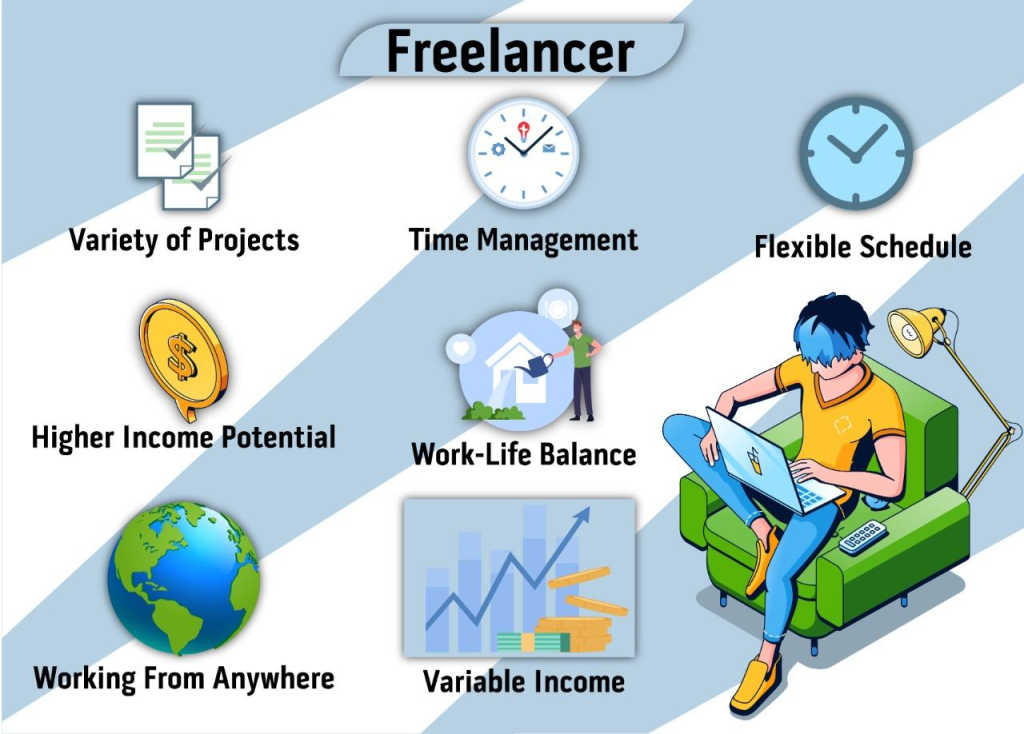
What is a freelancer?
A freelancer is a self-employed individual who offers services to clients on a project-by-project basis, without being employed on a long-term contract by a single employer. Freelancers are often hired to provide specialized skills, expertise, or services that clients need for a specific duration or task.
Freelancers work independently and have the flexibility to choose their clients, projects, and working hours. They are responsible for finding their own clients, negotiating contracts and rates, delivering work, and managing their business affairs.
Freelancers can be found in a wide range of industries and professions, including but not limited to:
- Writing and Editing: Freelance writers, copywriters, editors, and content creators.
- Design and Creative Services: Graphic designers, web designers, illustrators, and photographers.
- Marketing and Advertising: Digital marketers, social media managers, SEO specialists, and advertising consultants.
- Programming and Web Development: Software developers, web developers, app developers, and programmers.
- Consulting and Professional Services: Management consultants, financial consultants, legal consultants, and HR consultants.
- Translation and Language Services: Translators, interpreters, and language tutors.
- Event Planning and Coordination: Event planners, wedding planners, and conference organizers.
- Virtual Assistance and Administrative Support: Virtual assistants, administrative assistants, and customer service representatives.
Freelancing offers individuals the opportunity to have more control over their work and lifestyle. However, it also requires self-motivation, discipline, and the ability to manage finances and business operations effectively.
It’s worth noting that the term “freelancer” is often used interchangeably with terms like “independent contractor” or “solopreneur,” depending on the specific legal and tax regulations of each country.
How to become a freelancer?

To embark on a freelancing career, begin by evaluating your skills and expertise. Determine a niche that aligns with your strengths and interests. Research the market to understand the demand for your services and identify potential clients. Create a portfolio that showcases your best work, and establish an online presence through a professional website or portfolio. Network with professionals in your industry to build connections and explore collaboration opportunities. Develop a marketing strategy to promote your services and attract clients. Set your pricing structure based on factors like your experience and the value you provide. Continuously upgrade your skills through learning and professional development. Finally, prioritize exceptional customer service to build a strong reputation and foster client satisfaction.
- Evaluate Your Skills and Interests: Take inventory of your abilities and interests to identify the services you can offer as a freelancer, considering your strengths and passions.
- Select Your Freelance Niche: Determine a specific area of expertise within your field that allows you to position yourself as an expert and cater to a targeted audience.
- Conduct Market Research: Understand the demand for your services by researching your potential clients, competitors, and industry trends, which helps you identify opportunities and challenges.
- Define Your Ideal Client: Create a profile of your ideal client, identifying their characteristics, needs, and pain points. This helps you tailor your marketing strategies and client acquisition efforts.
- Build a Strong Portfolio: Assemble a portfolio that showcases your best work, including samples, case studies, or testimonials that highlight your skills, experience, and the value you bring to clients.
- Establish Your Pricing Structure: Determine how you will charge for your services, considering factors such as your experience, market rates, project complexity, and desired income. Options include hourly rates, project-based fees, or retainer arrangements.
- Develop Your Professional Brand: Create a compelling personal brand that reflects your expertise, values, and unique selling proposition. Design a professional logo, choose consistent visual elements, and craft a compelling brand message.
- Establish Your Online Presence: Set up a professional website or portfolio to showcase your services, work samples, and contact information. Utilize relevant social media platforms to promote your work and engage with potential clients.
- Network and Connect with Professionals: Attend industry events, join online communities, and network with fellow professionals. Engage in conversations, offer insights, and build relationships that can lead to referrals and collaborations.
- Devise a Marketing Strategy: Define your marketing channels and tactics based on your target audience. This may include content marketing, social media campaigns, email marketing, or paid advertising. Tailor your strategy to effectively reach and engage your potential clients.
- Create Persuasive Proposals and Contracts: Develop templates for your proposals and contracts that clearly outline the scope of work, deliverables, timelines, payment terms, and relevant conditions to protect both parties’ interests.
- Begin with Small Projects: Start by taking on smaller projects or offering your services at competitive rates to gain experience and build a track record. Focus on delivering exceptional work and fostering positive client relationships.
- Request Testimonials and Referrals: After successfully completing projects, proactively ask satisfied clients for testimonials or referrals. Testimonials provide credibility, while referrals can bring in new clients and opportunities.
- Invest in Continuous Learning and Skill Enhancement: Stay updated with industry trends, tools, and technologies. Invest in your professional development through courses, webinars, workshops, or conferences, allowing you to offer enhanced value to clients and remain competitive.
- Provide Excellent Customer Service: Deliver exceptional customer service throughout your freelance career. Promptly respond to client inquiries, communicate clearly, and go above and beyond to exceed expectations. Satisfied clients are more likely to recommend you and become repeat clients.
Remember that the journey to becoming a successful freelancer takes time, persistence, and a commitment to continuous learning. Customize these steps to suit your specific field and circumstances, while always prioritizing the delivery of value to your clients.
Benefits of being a freelancer

Being a freelancer offers numerous benefits:
- Flexibility: Freelancers enjoy the freedom to determine their own schedules and work locations, allowing for better work-life balance and the ability to accommodate personal commitments.
- Independence: Freelancers are their own bosses, making all decisions related to their work, from choosing clients to setting rates and selecting projects. This autonomy allows for greater control over one’s professional path.
- Diverse Projects: Freelancers have the opportunity to work on a variety of projects across different industries and with various clients. This diversity keeps the work engaging, promotes continuous learning, and enhances skill development.
- Higher Earning Potential: Freelancers can set their rates based on their skills, experience, and the value they offer. As expertise and reputation grow, freelancers can command higher rates, resulting in increased income potential compared to traditional employment.
- Skill Enhancement: Freelancing fosters ongoing skill development. Working on diverse projects and collaborating with different clients exposes freelancers to new challenges, allowing them to refine existing skills and acquire new ones.
- Geographic Freedom: Freelancers have the flexibility to work from anywhere, whether it’s from home, a coffee shop, or while traveling. This freedom eliminates commuting time and expenses, offering a greater sense of freedom and convenience.
- Networking Opportunities: Engaging with professionals in the industry, attending events, and building a strong network can lead to collaboration, referrals, and new business opportunities.
- Creative Freedom: Freelancers have the space to explore their creativity and experiment with innovative approaches. Without organizational constraints, they can think outside the box and deliver unique solutions.
- Personal Satisfaction: Freelancers can align their work with their passions and interests, allowing for a greater sense of personal fulfillment and enjoyment in their professional pursuits.
- Reduced Overhead Costs: Freelancers often have lower overhead costs compared to traditional businesses. They can operate from their existing resources and eliminate expenses associated with office spaces and equipment.
- Client Selection: Freelancers have the ability to choose the clients they work with, ensuring a good fit in terms of values, expectations, and working style. This control leads to more satisfying client relationships.
- Tax Benefits: Freelancers can take advantage of tax deductions available to self-employed individuals. These deductions can help reduce the tax burden and optimize financial management.
- Work Environment: Freelancers can create a work environment tailored to their preferences, fostering productivity and well-being. They have the freedom to design their workspace and cultivate a positive atmosphere.
- Personal Growth: Freelancing promotes personal growth by fostering independence, self-discipline, and self-motivation. It requires continuous learning, adaptability, and the development of essential business skills.
- Opportunity for Professional Expansion: With the ability to select projects and clients, freelancers have the opportunity to strategically expand their skills, knowledge, and expertise in desired areas.
It’s important to note that while freelancing offers these benefits, it also comes with challenges such as managing income fluctuations, self-promotion, and maintaining a consistent client base. However, for individuals seeking flexibility, autonomy, and the chance to pursue their passions, freelancing can be a fulfilling and rewarding career path.
Benefits of Being a Corporate Freelancer
As a “company freelancer,” which typically refers to freelancers who operate as a registered business entity or have formed their own company, there are several benefits that can be enjoyed:
- Professional Image: Operating as a company freelancer can enhance your professional image and credibility. Clients may perceive you as more established, reliable, and trustworthy, which can lead to better business opportunities.
- Legal Protection: Registering your freelance work as a company provides a level of legal protection. It separates your personal assets from your business liabilities, which can shield your personal finances in case of legal issues or debts.
- Branding Opportunities: Establishing a company allows you to build and promote a distinct brand identity. You can create a unique company name, logo, and visual identity that sets you apart from individual freelancers and helps you stand out in the market.
- Scalability and Growth: As a company freelancer, you have the potential to scale your business and handle larger projects. With the ability to hire additional team members or subcontract work, you can take on more complex and extensive projects that would be challenging as an individual freelancer.
- Collaboration and Partnerships: Operating as a company freelancer opens up opportunities for collaborations and partnerships with other businesses. You can form strategic alliances, joint ventures, or subcontract work to other freelancers or companies, allowing for broader service offerings and expanding your client base.
- Access to Contracts and Opportunities: Certain contracts and business opportunities may require working with registered companies. Being a company freelancer positions you to compete for and secure these contracts, which can provide more stability and higher-value projects.
- Tax Advantages: Forming a company can offer potential tax benefits and deductions not available to individual freelancers. Consult with a tax professional to understand the specific advantages and optimize your tax management strategies.
- Business Support and Resources: Operating as a company freelancer grants access to various business resources and support services. These may include networking events, business associations, mentorship programs, and specialized professional advice tailored to companies.
- Long-Term Sustainability: By establishing a company, you create a foundation for long-term sustainability. It allows you to plan for the future, build a strong client base, and develop strategies for growth and expansion.
- Increased Perceived Value: Clients may perceive company freelancers as more capable of handling larger projects, offering a wider range of services, and maintaining consistent quality. This perception can lead to increased client trust and willingness to invest in your services.
Remember that operating as a company freelancer also entails additional responsibilities, such as maintaining proper business records, complying with legal and tax obligations, and managing the administrative aspects of running a business. It’s important to carefully consider the advantages and requirements of operating as a company freelancer before making the decision.
Thanks,






Leave a Reply
You must be logged in to post a comment.